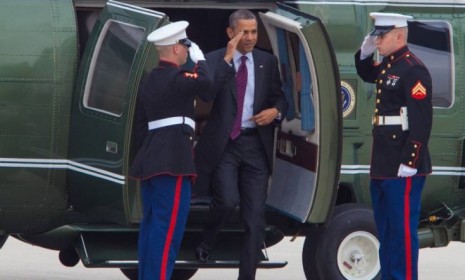4 reasons Obama became a hawk
How did President Obama go from winning the Nobel Peace Prize to being the final arbiter of a terrorist "kill list"?

A free daily email with the biggest news stories of the day – and the best features from TheWeek.com
You are now subscribed
Your newsletter sign-up was successful
When "liberal law professor" Barack Obama was elected in 2008, many supporters expected him to reverse the hardline military and intelligence policies that characterized George W. Bush's tenure, says Paul Harris at Britain's The Observer. Instead, "the sheer scope and breadth of Obama's national security policy has stunned even fervent Bush supporters and members of the Washington, D.C., establishment." Drastically ramping up the use of drone attacks, personally overseeing a "kill list" of suspected terrorists, cracking down on whistleblowers, approving a cyberattack on Iran, and failing to close Guantanamo Bay — how did Obama become such a hawk? Here, four theories:
1. He became commander-in-chief
Obama "didn't campaign as a dove" in 2008, says James Joyner at Outside the Beltway, and some of his critics' other accusations are "misleading or otherwise unfair" — blaming Obama for the actions of Congress or the Supreme Court. But it is true that Obama has become more hawkish, and the obvious explanation is: "He became president." It's unquestionably "easier to be faithful to principles of civil liberties, due process, information transparency, and the like" when you don't have the weight of protecting the nation on your shoulders and "a daily — if not hourly — deluge of information" about "all the bad things that might happen" if you don't act.
The Week
Escape your echo chamber. Get the facts behind the news, plus analysis from multiple perspectives.

Sign up for The Week's Free Newsletters
From our morning news briefing to a weekly Good News Newsletter, get the best of The Week delivered directly to your inbox.
From our morning news briefing to a weekly Good News Newsletter, get the best of The Week delivered directly to your inbox.
2. The foreign policy establishment is uniformly hawkish
The president isn't alone in his shift, says Aaron David Miller at Foreign Policy. If anything, he's been shaped by "a remarkable consensus among Democrats and Republicans on a core approach to the nation's foreign policy" since 9/11. That consensus, and Obama's policies, aren't a mere continuation of Bush's approach — aversion to Bush-style "ill-advised military campaigns... is now bipartisan theology as well" — but no president in the foreseeable future will disregard the ex-president's "tough and largely successful approach to counterterrorism."
3. His hawkishness neuters Republicans
Probably not entirely coincidentally, Obama's hardline foreign policy helps "insulate him from the 'weak on defense' political attacks that Republicans have historically leveled against Democrats," says Michael Shear at The New York Times. Liberals may not like it, but Obama's hawkishness has flummoxed Mitt Romney's attempt to paint Obama as "a feckless, indecisive foreign policy leader." We applaud Obama's able and aggressive use of different types of force, like cyberattacks, says the New York Daily News in an editorial. But he shouldn't be getting political mileage out of them by, apparently, leaking them to the press. Sometimes officials have a "moral, strategic, and legal duty to keep secrets."
A free daily email with the biggest news stories of the day – and the best features from TheWeek.com
4. He's just more open about military operations
The White House denies "in the strongest possible terms" that it leaked any information about the Iran cyberattack, but in other security matters — especially those already reported by the media — Obama has consciously "tried to be more open" than his predecessors about once-secretive programs, says Adam Levine at CNN. Keeping the public informed as much as is safely possible is an "obligation," National Security Council spokesman Tommy Vietor tells CNN. "I'm not going to get into internal deliberations, but as a general matter we obviously push to be as transparent as we can while being mindful of our national security equities."